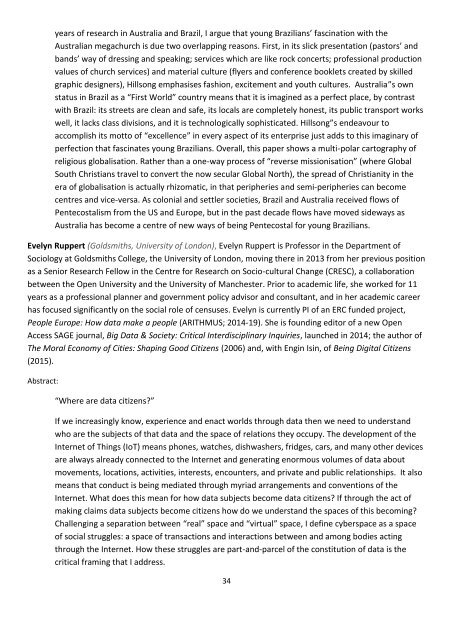Crossroads in Cultural Studies Conference 14-17th December 2016 Program Index
Crossroads-2016-final-draft-program-30-Nov
Crossroads-2016-final-draft-program-30-Nov
You also want an ePaper? Increase the reach of your titles
YUMPU automatically turns print PDFs into web optimized ePapers that Google loves.
years of research <strong>in</strong> Australia and Brazil, I argue that young Brazilians’ fasc<strong>in</strong>ation with the<br />
Australian megachurch is due two overlapp<strong>in</strong>g reasons. First, <strong>in</strong> its slick presentation (pastors’ and<br />
bands’ way of dress<strong>in</strong>g and speak<strong>in</strong>g; services which are like rock concerts; professional production<br />
values of church services) and material culture (flyers and conference booklets created by skilled<br />
graphic designers), Hillsong emphasises fashion, excitement and youth cultures. Australia”s own<br />
status <strong>in</strong> Brazil as a “First World” country means that it is imag<strong>in</strong>ed as a perfect place, by contrast<br />
with Brazil: its streets are clean and safe, its locals are completely honest, its public transport works<br />
well, it lacks class divisions, and it is technologically sophisticated. Hillsong”s endeavour to<br />
accomplish its motto of “excellence” <strong>in</strong> every aspect of its enterprise just adds to this imag<strong>in</strong>ary of<br />
perfection that fasc<strong>in</strong>ates young Brazilians. Overall, this paper shows a multi-polar cartography of<br />
religious globalisation. Rather than a one-way process of “reverse missionisation” (where Global<br />
South Christians travel to convert the now secular Global North), the spread of Christianity <strong>in</strong> the<br />
era of globalisation is actually rhizomatic, <strong>in</strong> that peripheries and semi-peripheries can become<br />
centres and vice-versa. As colonial and settler societies, Brazil and Australia received flows of<br />
Pentecostalism from the US and Europe, but <strong>in</strong> the past decade flows have moved sideways as<br />
Australia has become a centre of new ways of be<strong>in</strong>g Pentecostal for young Brazilians.<br />
Evelyn Ruppert (Goldsmiths, University of London), Evelyn Ruppert is Professor <strong>in</strong> the Department of<br />
Sociology at Goldsmiths College, the University of London, mov<strong>in</strong>g there <strong>in</strong> 2013 from her previous position<br />
as a Senior Research Fellow <strong>in</strong> the Centre for Research on Socio-cultural Change (CRESC), a collaboration<br />
between the Open University and the University of Manchester. Prior to academic life, she worked for 11<br />
years as a professional planner and government policy advisor and consultant, and <strong>in</strong> her academic career<br />
has focused significantly on the social role of censuses. Evelyn is currently PI of an ERC funded project,<br />
People Europe: How data make a people (ARITHMUS; 20<strong>14</strong>-19). She is found<strong>in</strong>g editor of a new Open<br />
Access SAGE journal, Big Data & Society: Critical Interdiscipl<strong>in</strong>ary Inquiries, launched <strong>in</strong> 20<strong>14</strong>; the author of<br />
The Moral Economy of Cities: Shap<strong>in</strong>g Good Citizens (2006) and, with Eng<strong>in</strong> Is<strong>in</strong>, of Be<strong>in</strong>g Digital Citizens<br />
(2015).<br />
Abstract:<br />
“Where are data citizens?”<br />
If we <strong>in</strong>creas<strong>in</strong>gly know, experience and enact worlds through data then we need to understand<br />
who are the subjects of that data and the space of relations they occupy. The development of the<br />
Internet of Th<strong>in</strong>gs (IoT) means phones, watches, dishwashers, fridges, cars, and many other devices<br />
are always already connected to the Internet and generat<strong>in</strong>g enormous volumes of data about<br />
movements, locations, activities, <strong>in</strong>terests, encounters, and private and public relationships. It also<br />
means that conduct is be<strong>in</strong>g mediated through myriad arrangements and conventions of the<br />
Internet. What does this mean for how data subjects become data citizens? If through the act of<br />
mak<strong>in</strong>g claims data subjects become citizens how do we understand the spaces of this becom<strong>in</strong>g?<br />
Challeng<strong>in</strong>g a separation between “real” space and “virtual” space, I def<strong>in</strong>e cyberspace as a space<br />
of social struggles: a space of transactions and <strong>in</strong>teractions between and among bodies act<strong>in</strong>g<br />
through the Internet. How these struggles are part-and-parcel of the constitution of data is the<br />
critical fram<strong>in</strong>g that I address.<br />
34


